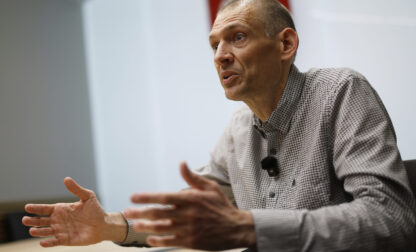After eight years on the White House beat, AP’s Julie Pace is a leader among correspondents in fighting for access to the president and his advisers, and over those years she routinely has resisted any efforts to exclude the press unreasonably from news events or obscure the president’s schedule.
On Friday, she recognized instantly that what was happening at the White House was anything but routine: a first-in-memory, invitation-only daily briefing by the presidential press secretary from which other news organizations were excluded. Her spot-on instinct to walk out put The Associated Press at the forefront of the fight for access and openness.
Pace’s quick decision reverberated across Washington and the country – and earns the Beat of the Week.
The daily briefing with the press secretary is typically on camera, on the record and open to all reporters who are credentialed to cover the White House. Cable news networks often broadcast live. The briefings are a critical tool for extracting information and a daily opportunity to hold the U.S. government accountable.
Pace’s decision made the AP one of two organizations that declined to participate, and instantly drew attention to the White House’s move toward exclusion.
On a day when President Donald Trump appeared before conservative activists and blasted news organizations for stories critical of his administration, Pace got wind that the White House was planning to dramatically limit access to the daily briefing, just minutes before the scheduled start time.
She called her editor, but didn’t have time to talk it through. She hung up, grabbed her computer and went up to the briefing, along the way walking through a crowd of colleagues being turned away. When she walked in and saw the small group, which excluded major organizations while including several partisan-leaning outlets, Pace knew the AP should not condone the arrangement.
She left immediately.
White House bars major news outlets from briefing; AP declines to participate. https://t.co/HuMEgi7NXv
— The Associated Press (@AP) February 24, 2017
Although AP had been included along with the usual “pool” of reporters who travel with the president,the White House press office denied entry to the briefing to the New York Times and CNN,which had been criticized by Trump in recent weeks,and other media organizations – while outlets whose coverage is typically more favorable made the cut.
Pace’s decision made the AP one of two organizations,along with Time magazine,that declined to participate, and instantly drew attention to the White House’s move toward exclusion. The briefing itself fast became major news. Pace coordinated with acting Washington bureau chief Wendy Benjaminson and corporate communications to put out a brief statement.
“We are lucky to have a White House correspondent who thinks quickly – and wisely – on her feet not only about the stories she and her colleagues are working on … but about the larger journalism issues as well.” — Wendy Benjaminson, acting Washington bureau chief
Later,Executive Editor Sally Buzbee,interviewed on PBS’ NewsHour, said: “We think that the public deserves as much access to the president and other governing officials as possible. When we find ourselves in a situation where national news organizations seem to be being deliberately excluded,we think that’s dangerous territory.”
Said Benjaminson: “We are lucky to have a White House correspondent who thinks quickly – and wisely – on her feet not only about the stories she and her colleagues are working on at any given moment,but about the larger journalism issues as well.”
AP’s stance was cheered by other outlets and applauded by many readers. It was a reminder of the critical role that journalists play every day in the halls of power in Washington – and statehouses and city halls across the country – to fight for access to decision-makers and ensure that the public can stay informed.
For her quick decision spotlighting the principle that access to leaders should be as open as possible, Pace win’s this week’s $500 prize.




